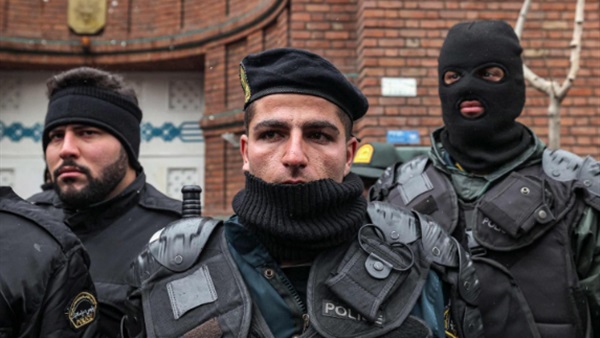Iran’s Revolutionary Guard given extra billions as economy collapses

Iran’s feared state security forces, which have played a
violent role in suppressing nationwide protests, have been allocated $3 billion
in the latest budget, despite the country’s collapsing economy.
Announced several weeks late by the government, the budget
for the state militia, the Islamic Revolutionary Guard Corps (IRGC), has been
raised by 28 per cent. Some experts estimate the actual income of the militia
could be as high as $17 billion.
The IRGC is a secretive organisation which also receives
income from illicit oil sales and is known to fund terror groups across the
region, including Hezbollah in Lebanon and the Houthis in Yemen.
“Leaked audio tapes some months ago revealed that [the
supreme leader, Ayatollah Ali] Khamenei reportedly directed 90 per cent of the
revenue generated by Yas Holding, an IRGC-linked company, be given to the
IRGC’s Quds Force, so they are not solely dependent on the national budget,”
said US-based Iran expert Jason Brodsky, policy director of United Against
Nuclear Iran.
Last year, the Hamas leader, Ismail Haniyeh, revealed that
Iran had recently given $70 million to the militant Palestinian group —
proscribed by the UK in 2021 as a terrorist organisation — which runs the Gaza
Strip to help it develop missiles and defence systems.
UK politicians are now calling for the IRGC to be designated
a terror group. The foreign secretary, James Cleverly, announced last month
that sanctions had been imposed on the IRGC after it emerged that it was
planning attacks on Iranian dissidents living in the UK.
The budget of Iran’s regular army has also increased by 36
per cent to over $1.22 billion and the police budget will rise 44 per cent to
reach $1.55 billion. The intelligence ministry has received a 52 per cent
boost, the equivalent of about $500 million, and funding for prisons has been
increased by 55 per cent, or $230 million.
Since protests began in September triggered by the death in
custody of Mahsa Amini, 22, who was arrested for the inappropriate wearing of
her headscarf, an estimated 19,401 Iranians have been detained. This includes
713 students and 168 children, while 524 people have been killed, according to
Iran’s Human Rights Activists News Agency. So far, a total of 11,721 months of
prison sentences have been handed out, with at least four protesters executed.
Iranian journalist Kourosh Ziabari said the “militarisation
of the budget” is in opposition to the needs of the population. “What is worse
is that despite the budget being drafted for a year of austerity, the outlays
for propaganda organisations, including the Islamic Republic of Iran
Broadcasting [whose budget rose by 49 percent or about $200 million] and
religious and cultural entities that usually have little benefits for the
general public, have been augmented exponentially.”
Many ordinary people are unable to afford fruit and
vegetables as the country’s currency continues to plummet. Prices have gone up
so rapidly that consumption halved last year. In the once bustling marketplace
of the Iranian city of Rasht, even fruit sellers and bakers can no longer make
ends meet. What used to be a hub for the city’s locals — a colourful display of
spices, fruits, local sweets and freshly-baked bread — now symbolises Iran’s
economic malaise.
“I have stopped bringing in staples in large quantities
because they remain on the shelf and go mouldy,” said Mehrdad, who has worked
in the market selling fruit for over three decades. Inflation has soared to
over 50 per cent, the highest level in recent history, while more than half of
Iranians are being pushed below the poverty line, according to the Statistical
Centre of Iran.
Ahmad, 70, lives on his $40 a month pension in a rented
house with his unemployed son. “My salary is adequate for almost nothing, and
it’s used up halfway through the month,” he said. “They have multiplied the
water and electricity bills, and the fees are beyond the limits of my
capability.”
“When my son was ill a few months back, I couldn’t even take
him to the doctor because of how unreasonable the medical expenses are. We
can’t even afford to be unwell today,” Ahmad said.
Iran is selling off its oil at heavily discounted prices as
western sanctions cripple the country’s energy revenues, according to Iranian
economic expert Mardo Soghom. He said it is now being sold for $37 a barrel —
which means only $7 profit per barrel — to China.
“During Trump, China was buying much less, 150,000 barrels a
day, but after the Biden era, oil exports to China increased tremendously to
700,000 a day,” said Soghom. The regular price is more like $70 a barrel.
Even though the country is sitting on the world’s second
largest gas reserves after Qatar, it also lacks the technology to maximise its
great wealth. Iranians are being told to turn down their heating in the middle
of winter.
“They need bigger
platforms and huge pumps in order to extract the gas,” Soghom said. “Even their
distribution network is a source of waste, around 40 per cent of energy getting
lost, including electricity. They have had to shut down factories in order to
get heat to households and last month, the government cut gas to 800 government
entities to divert energy to homes because there was a snow storm.
“To improve production, the government needs about $40
billion in investments and western technology,” he added. “This kind of
technology is only available to western firms like Total and Exxon. China and
Russia don’t even have this. Russia relies on BP for this kind of stuff, so
with this foreign policy they [Iran] have, stuck in their animosity with the
West, they have neither the money nor technology to improve like Qatar does.”







